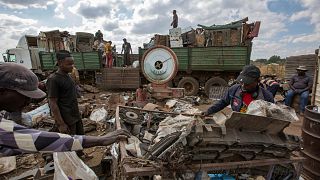Environment pollution
As we mark World Environment Day, conservation groups around the globe are renewing calls to end plastic pollution.
More than 400 million tonnes of plastic are produced worldwide every year, but just half of this is designed to be used only once, and less than 10 per cent is recycled.
An estimated 11 million tonnes of it ends up in the sea, on rivers, and in lakes, with the United Nations warning that by 2050, there may be more plastic in the ocean than fish.
And microplastics – or tiny particles of up to 5 millimetres in diameter – find the way into our food, water, air, and even our bodies.
Even although Africa consumers only an estimated 4 per cent of the world’s plastic, across the continent, plastic pollution is a signification environmental challenge.
The Worldwide Fund for Nature says most of Africa’s rural towns, cities, rivers, and coastlines are heavily pollution with discarded plastic packaging.
With a large portion of the waste mismanaged, it ends up in landfills and waterways where it contaminates ecosystems and poses potential health risks.
The United Nations is calling on government, companies, and other stakeholders to speed up actions to solve the crisis.











00:47
US YouTube star IShowSpeed celebrates 21st birthday in Lagos
Go to video
US House passes 3-year AGOA extension but South Africa's inclusion is unclear
02:31
Plastic pollution threatens Lake Malawi’s unique fish
02:17
AFCON 2025: The coelacanth, Comoros' national symbol in football and beyond
01:32
Africa Cup of Nations moves to 4-year cycle
00:54
Spanish police evict hundreds of mostly illegal migrants living in a squat